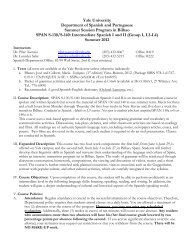Yale Summer Session and Yale University
Yale Summer Session and Yale University
Yale Summer Session and Yale University
You also want an ePaper? Increase the reach of your titles
YUMPU automatically turns print PDFs into web optimized ePapers that Google loves.
<strong>Yale</strong> <strong>Summer</strong> <strong>Session</strong> 2012 <strong>Summer</strong> Faculty H<strong>and</strong>book<br />
adjustments will be necessary based on the different structure of summer courses.<br />
These adjustments, while they may affect the reading list or assignments, must not in<br />
any way compromise the intellectual content <strong>and</strong> ultimate goals of the course.<br />
3. Meeting Times<br />
The number of classroom hours a course meets during the summer should be the<br />
same as during the AY. Generally speaking, one-credit courses meet for 32.5 hours. To<br />
translate that into regular meeting times during a 5-week session, we have developed<br />
the following scheme for planning purposes:<br />
2 DAYS PER WEEK 3 DAYS PER WEEK 5 DAYS PER WEEK SUMMER LANGUAGES<br />
T,TH M,W,F M-F M-F<br />
3.25 hours each 2.25 hours each 1.25 hours each 3 hours each<br />
Most all humanities <strong>and</strong> social science courses should meet at least three times a week.<br />
It is felt that meeting twice a week, except in rare circumstances, is not adequate in<br />
terms of classroom interaction. The days a class meets are somewhat flexible although<br />
we try to stick to this scheme, as it allows us to maximize the use of the limited<br />
classroom space available, i.e. it reduces the amount of time a classroom is empty<br />
because it can’t be scheduled for any other class at an odd time. The meeting hours<br />
themselves are therefore also regularized in the following scheme:<br />
M,W,F T,TH M-F M-F, LANGUAGES<br />
9-11:15 9-12:15 9-10:15 9-12<br />
1-3:15 1-4:15 11-12:15 1-4<br />
3:30-5:45 1-2:15<br />
3-4:15<br />
It is important to note that summer times are based on full 60-minute hours, not 50minute<br />
class times. For example, classes actually need to meet for 135 minutes three<br />
times per week, or 195 minutes twice per week, with appropriate breaks, of course. As<br />
is apparent from the chart above, evening times are normally not scheduled. These<br />
times are left open for film screenings <strong>and</strong> activities in the residential colleges. Finally,<br />
lab times, certain science courses, <strong>and</strong> other special courses, such as art courses or<br />
intensive workshops, may differ from the regular scheme. Requests for specific times<br />
should always be made to the dean well before the course description is published in<br />
the catalogue. Please do not change your course meeting days or times without first<br />
consulting with the dean. Changing the days or times of a course can create immense<br />
problems for students whose schedules are not as flexible as they would be during the<br />
academic year, since courses meet for longer periods at a time.<br />
4. Syllabi<br />
Every course should have its syllabus available at <strong>Summer</strong> <strong>Session</strong>. New courses<br />
absolutely need to submit a syllabus specifically for the summer. It is clear how<br />
11



